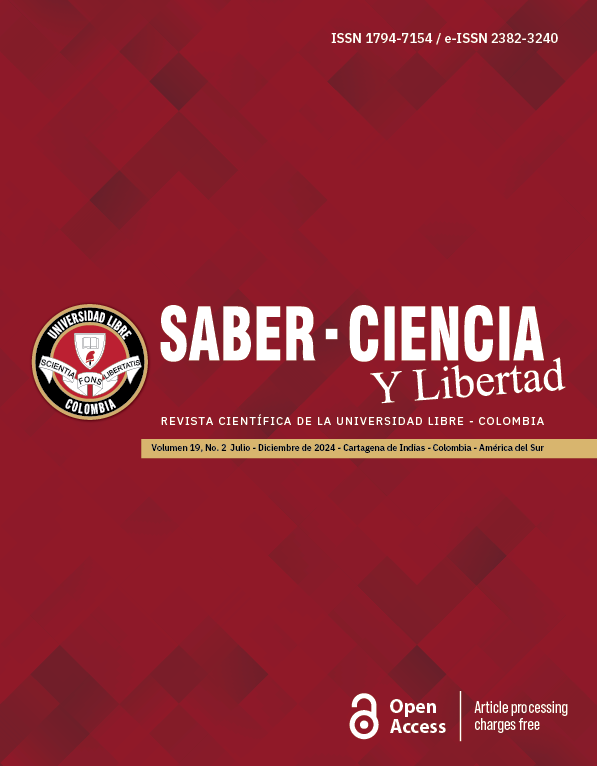Students’ perspectives on social science education at school: toward a restorative pedagogy
DOI:
https://doi.org/10.18041/2382-3240/saber.2024v19n2.12012Keywords:
Social sciences, education, curriculum, restorative pedagogy, guarantees of non-repetitionAbstract
This study, aiming to foster a restorative pedagogy, explores perspectives on secondary social science education among students from Simón Bolívar University in the city of Cúcuta. The article gathers sources analyzing Colombia’s educational problems in the area of citizenship competencies and social sciences to help understand this epistemological field. Additionally, the restorative effect of students’ education was studied quantitatively based on their recognition of the social science curriculum. An exploratory qualitative research methodology was followed, and analytical categories were established to interpret results and, subsequently, draw conclusions.
References
Adorno, T. (1998). Educación para la emancipación. Madrid.
Albertí, M., & Boqué, M. (2015). Hacia una pedagogía restaurativa: superación del modelo punitivo en el ámbito escolar. Revista de Mediación, 8(1), 36-49.
Castellanos, A. J. (2021). El currículo y la enseñanza de las ciencias sociales en Colombia: un análisis a las orientaciones del Ministerio de Educación Nacional (1984 - 2016) [Tesis de maestría, Universidad Nacional de Colombia]. http://hdl.handle.net/11349/26617
CICR (2023). Protocol Additional to the Geneva Conventions of 12 August 1949 and relating to the Protection of Victims of Non-International Armed Conflicts (Protocol II), 8 June 1977. https://ihl-databases.icrc.org/en/ihl-treaties/apii-1977
Hernández, R., Fernández, C., & Baptista, M. (2014). Metodología de la investigación (6ª ed.). McGraw Hill Education.
Llinás, C., & Aníbal, D. (2022). Pedagogía restaurativa: una propuesta de resignificación educativa para la reconstrucción del tejido social en Colombia. Estudios Pedagógicos, 48(2), 159-178.
Mena, N. (2018). El currículo de ciencias sociales y las pruebas Saber 11 en Colombia: consonancias y disonancias. Voces y Silencios. Revista Latinoamericana de Educación, 9(2), 80-106. https://doi.org/10.18175/vys9.2.2018.06
Ministerio de Educación (2004). Estándares por competencias de Ciencias Sociales. Mineducación.
Ministerio de Educación (2006). Estándares básicos por competencias en lenguaje, matemáticas, ciencias y competencias ciudadanas: guía sobre lo que deben saber y saber hacer con lo que aprendan. Mineducación.
Ortega, P., Castro, C., Merchán, J., & Vélez, G. (2015). Pedagogía de la memoria para un amnésico. Universidad Pedagógica Nacional.
Ricoeur, P. (2000). La memoria, la historia y el olvido. Fondo de Cultura Económica.
Silva, G. (2008). La teoría del conflicto. Un marco teórico necesario. Prolegómenos. Derechos y Valores, 11(22), 29-43.
Schmitz, J. (2018). Prácticas restaurativas para la prevención y gestión de conflictos en el ámbito educativo: Guía de formación. Imprenta Cerro Azul S.R.L.
Schmitz, J. (2021). El enfoque restaurativo para la construcción de paz desde la escuela. Escuela y Pedagogía. https://escuelaypedagogia.educacionbogota.edu.co/miradas/elenfoque-restaurativo-para-la-construccion-de-paz-desde-la-escuela
Zuleta, E. (2001). Educación y democracia. Hombre Nuevo Editores.
Downloads
Published
Versions
- 2025-02-11 (2)
- 2024-07-26 (1)
Issue
Section
License
Copyright (c) 2025 Saber, Ciencia y Libertad

This work is licensed under a Creative Commons Attribution-NonCommercial-ShareAlike 4.0 International License.





